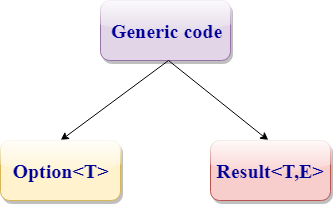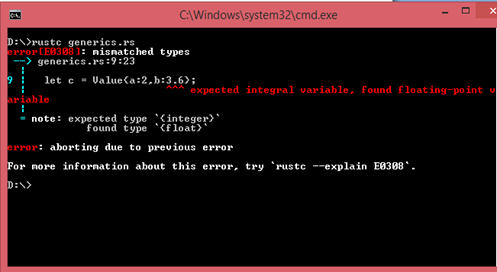📅 最后修改于: 2021-01-08 13:53:21 🧑 作者: Mango
锈泛型
当我们要创建多种形式的函数时,即函数的参数可以接受多种类型的数据。这可以通过泛型来实现。泛型也称为“参数多态性”,其中poly是多个,而morph是形式。
提供通用代码有两种方法:
- 选项
- 结果

1. Option
enum Option
{
Some(T),
None,
}
在上述情况下, enum是自定义类型,其中
let x : Option = Some(10); // 'T' is of type i32.
let x : Option = Some(true); // 'T' is of type bool.
let x : Option = Some(10.5); // 'T' is of type f64.
let x : Option = Some('b'); // 'T' is of type char.
在上述情况下,我们观察到“ T”可以是任何类型,即i32,bool,f64或char。但是,如果左侧的类型和右侧的值不匹配,则会发生错误。让我们来看一下:
let x : Option = Some(10.8);
在上述情况下,左侧的类型为i32,右侧的值为f64类型。因此,错误发生“类型不匹配” 。
2. Result
enum Result
{
OK(T),
Err(E),
}
注意:并非必须使用'T'和'E'作为约定。我们可以使用任何大写字母。
通用功能
泛型可以在函数中使用,我们将泛型放在函数的签名中,在该签名中指定了参数的数据类型和返回值。
- 当函数包含类型为'T'的单个参数时。
句法:
fn function_name(x:T)
{
// body of the function.
}
上面的语法分为两部分:
:给定的函数是一种类型的泛型。 - (x:T):x为T类型。
当函数包含多个相同类型的参数时。
fn function_name(x:T, y:T)
{
// body of the function.
}
当函数包含多种类型的参数时。
fn function_name(x:T, y:U)
{
// Body of the function.
}
fn main()
{
let a = vec![1,2,3,4,5];
let b = vec![2.3,3.3,4.3,5.3];
let result = add(&a);
let result1 = add(&b);
println!("The value of result is {}",result);
println!("The value of result1 is {}",result1);
}
fn add(list:&[T])->T
{
let mut c =0;
for &item in list.iter()
{
c= c+item;
}
c}
结构定义
结构还可以使用<>运算符在一个或多个字段中使用通用类型参数。
句法:
struct structure_name
{
// Body of the structure.
}
在上面的语法中,我们在structure_name之后的尖括号中声明泛型类型参数,然后可以在struct定义中使用泛型类型。
让我们看一个简单的例子:
struct Value
{
a:T,
b:T,
}
fn main()
{
let integer = Value{a:2,b:3};
let float = Value{a:7.8,b:12.3};
println!("integer values : {},{}",integer.a,integer.b);
println!("Float values :{},{}",float.a,float.b);
}
输出:
integer values : 2,3
Float values : 7.8,12.3
在上面的示例中,Value
让我们看另一个简单的例子。
struct Value
{
a:T,
b:T,
}
fn main()
{
let c = Value{a:2,b:3.6};
println!("c values : {},{}",c.a,c.b);
}
输出:

在上面的示例中,Value
枚举定义
枚举也可以使用通用数据类型。Rust标准库提供了Option
- 选项
它包含两个变体,即Some(T)和None。

其中Some(T)保留T类型的值,而None不包含任何值。
我们看看吧:
enum Option
{
Some(T),
None,
}
在上述情况下,选项
- Result
:我们可以创建多种类型的泛型。这可以通过Result 实现。
enum Result
{
OK(T),
Err(E),
}
在上述情况下,Result
OK(T)保留类型'T'的值,而Err(E)保留类型'E'的值。
方法定义
我们可以在结构体和枚举上实现这些方法。
让我们看一个简单的例子:
struct Program {
a: T,
b: T,
}
impl Program
{
fn a(&self) -> &T
{
&self.a
}
}
fn main() {
let p = Program{ a: 5, b: 10 };
println!("p.a() is {}", p.a());
}
输出:
p.a() is 5
在上面的示例中,我们在Program
我们在暗示之后声明了“ T”,以表明我们正在Program
解决歧义
Rust编译器会自动推断出通用参数。让我们通过一个简单的场景来理解这一点:
Let mut v = Vec::new(); // creating a vector.
v.push(10); // inserts integer value into the vector. Therefore, v is of i32 type.
println!("{:?}", v); // prints the value of v.
在上述情况下,我们将整数值插入向量中。因此,Rust编译器知道向量v的类型为i32。
如果我们删除倒数第二行,则它看起来像;
Let mut v = Vec::new(); // creating a vector.
println!("{:?}", v); // prints the value of v.
上述情况将引发一个错误,即“它无法推断T的类型”。
- 我们可以通过两种方式解决上述情况:
1.我们可以使用以下注释:
let v : Vec = Vec::new();
println!("{:?}",v) ;
2.我们可以通过使用'turbofish':: <>运算符来绑定通用参数'T':
let v = Vec :: :: new();
println!("{:?}",v) ;